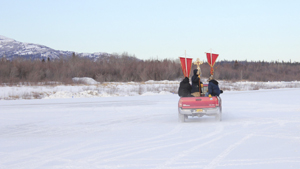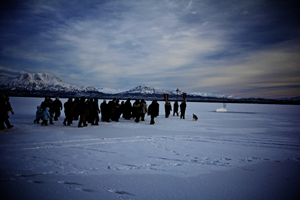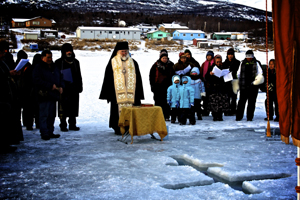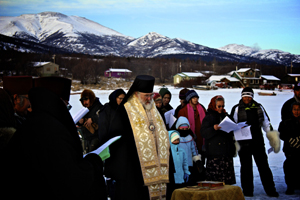Great Blessing of Water highlights threat to Alaska Native way of life

A pickup truck carries crosses and banners across the frozen lake to the site of the blessing. |
NONDALTON, AK [OCA]—On the morning of January 18, 2011—the Eve of the Great Feast of Theophany on the Julian Calendar—a two-engine Navajo bush plane carried His Grace, Bishop Benjamin from Anchorage through Lake Clark Pass to the Tanaina Athabaskan (Indian) village of Nondalton.
Accompanied by Igumen Gerasim, Archpriest Michael Oleksa, Barry Migyanko, and videographer Hanna Craig, Bishop Benjamin, who serves as the Locum Tenens of the Diocese of Alaska, joined the faithful there for the celebration of the Great Blessing of Water on the shores of Six Mile Lake, which connects Lake Ilimana with Lake Clark, and to pray that the villagers’ way of life might be preserved.

Bishop Benjamin and faithful process across the frozen lake. |
“Situated on the eastern boundary of a square mile area three times the size of Manhatten Island, Nondalton has been targeted by the Northern Dynasty/Anglo-American corporations to become the world’s largest open pit copper and gold mine, threatening the world’s largest salmon fishery,” explained Father Michael, Acting Chancellor of the Diocese. “The Orthodox villages of Newhalen, Igiugig, Levelock, Koliganek, New Stuyahok, Ekwok, Portage Creek, Naknek, and South Naknek and the city of Dillingham are all threatened by the opening of the Pebble Mine, which would become the world’s largest consumer of deadly cyanide as it processes and separates the ores.
Father Michael added that a 740 foot high earthen dam five times larger than one that recently collapsed in Hungary, poisoning the Danube River in Eastern Europe, would contain tons of pollutants and poisons—in an earthquake zone!

Bishop Benjamin blesses the waters by means of a hole cut into the ice in the shape of a cross. |
“Hundreds of Orthodox Alaska Natives have banded together to oppose the State of Alaska’s authorizing the development of the Pebble Project,” Father Michael said. “In an effort to express support for them in their struggle to save their culture, their way of life, their commitment to the land that has sustained them and their ancestors for the last 12,000 years, the Diocese of Alaska passed a unanimous resolution in 2009, invoking God’s blessing on any development that would improve the economy and enhance the quality of life in rural Alaska and withholding such approval for any that threatened to pollute or poison the ecosystem.
“The Alaska Native people are ‘the voice of the earth and must now speak up to defend and preserve the land that has sustained them for millenia,” Father Michael stated. “Since Northern Dynasty and Anglo-American are Canadian and British corporations, the profits from the Pebble Mine would largely flow outside the United States, while leaving tons of debris, equal to 3000 pounds for every person, man, woman and child on earth, at the end of the mining operation.”

Bishop Benjamin blesses the waters by means of a hole cut into the ice in the shape of a cross. |
As Bishop Benjamin led the clergy and faithful in the Great Blessing of Water, he invoked God’s blessing upon “these waters.” asking that they become a “fountain of holiness,” “sanctifying those who drink it, anoint themselves with it,” and “take it for the sanctification of their homes.”
“Maintaining the quality and protecting the purity of these rivers and lakes becomes a sacred duty for all Orthodox believers, not only in the region, but throughout the world,” Father Michael concluded.
